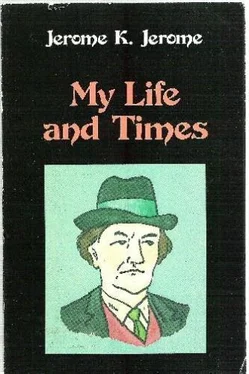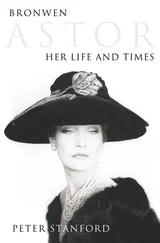“By his evening fire the artist
Pondered o'er his secret shame;”
I had the feeling that Longfellow must have been thinking about me. And when I read the last two lines:
“That is best which lieth nearest;
Shape from that thy work of art,”
it came to me that Longfellow was telling me not to bother about other people's troubles—those of imaginary maidens turned into waterfalls, and such like—but to write about my own. I would tell the world the story of a hero called Jerome who had run away and gone upon the stage; and of all the strange and moving things that had happened to him there. I started on it that same evening, and in three months it was finished. I hunted up an old actor named Johnson—the oldest actor on the boards, he boasted himself; and he certainly looked it. He had played with Edmund Kean, Macready, Phelps and Booth, not to mention myself. We had been at Astley's together, during the run of “Mazeppa.” It had fallen to our lot, in the third act, to unbind Lisa Weber from the exhausted steed, and carry her across the stage. I took her head and old Johnson her heels. She was what Mr. Mantalini would have called a demmed fine woman, weighing, I should think, some fourteen stone; and during the journey she would pour out blood-curdling threats as to what she would do to both or either of us if we dropped her. Old Johnson lost his temper one night: “Oh, come on, young 'un,” he called out to me in a loud whisper, “let's chuck her into the orchestra.” He began to heave his end. She kept quiet after that. He was now with Wilson Barrett at the old Princess's. I used to wait for him at the stage door, and we would adjourn to a little tavern in Oxford Market. It really was a market in those days, with wooden booths all round, and stalls in the centre; where now stands Oxford Mansions. He would look over my MS. to see that I had made no blunders; and the anecdotes and stories that he told me would have made a rattling good book of themselves. I meant to write it. But he died before we had completed it.
For a workroom I often preferred the dark streets to my dismal bed-sitting-room. Portland Place was my favourite study. I liked its spacious dignity. With my note-book and a pencil in my hand, I would pause beneath each lamp-post and jot down the sentence I had just thought out. At first the police were suspicious. I had to explain to them. Later they got friendly; and often I would read to them some passage I thought interesting or amusing. There was an Inspector—a dry old Scotchman who always reached Langham church as the clock struck eleven: he was the most difficult. Whenever I made him laugh, I went home feeling I had done good work.
When finished, it went the round of many magazines. I think I sent it first to The Argosy , edited by Mrs. Henry Wood. But the real editor was a little fat gentleman named Peters. He ran also The Girls' Own Paper , for which he wrote a weekly letter signed “Aunt Fanny,” giving quite good advice upon love, marriage, the complexion and how to preserve it, how to dress as a lady on fifteen pounds a year—all such-like things useful for girls to know. A kindly old bachelor. I came to know him. He lived in a dear little cottage in Surrey and was a connoisseur of port wine. George Augustus Sala, then editing Temple Bar , next had a chance of securing it. He wrote me that himself he liked it, but feared it was not quite the thing for family reading. Sala, also, was a connoisseur of port wine. He had a nose about which, like Cyrano de Bergerac, he was touchy. He brought a libel action once against a man who had made some chaffing remark about it at a public dinner. Sala was a brilliant talker, provided he had the table to himself. I remember a dinner-party in Harley Street at which a young doctor, unacquainted with Bohemia, and before poor Sala had got into his stride, started a story of his own. It was an interesting story, and he followed it up with another. The conversation became general. When at last we remembered Sala, we discovered he had gone home.
Afterwards I tried Tinsley's Magazine . I never found old Tinsley at his office, but generally at a favourite little place of his near by. Prohibition was not then within the range of practical politics, as Mr. Gladstone would have put it; and the editorial fraternity had not begun to even think about it. I remember the first man who ordered tea and toast at the Savage Club. The waiter begged his pardon, and the man repeated it. The waiter said “Yes, Sir,” and went downstairs and told the steward. Fortunately the steward was a married man. His wife lent her teapot, and took charge of the affair. It was the talk of the club for a fortnight. Most of the members judged it to be a sign of the coming decline and fall of English literature.
Eventually, despairing of the popular magazines, I sent it to a penny paper called The Play , which had just been started; and four days later came an answer. It ran:
“Dear Sir, I like your articles very much. Can you call on me to-morrow morning before twelve? Yours truly, W. Aylmer Gowing. Editor, The Play .”
I did not sleep that night.
Aylmer Gowing was a retired actor. As “Walter Gordon,” he had been leading juvenile at the Haymarket Theatre under Buckstone. “Gentleman Gordon,” Charles Mathews had nicknamed him. He had married well, and ran The Play at a yearly loss because he could not bear to be unconnected with his beloved stage. His wife, a little bird-like woman, wrote poetry for it. They lived in a pretty little house in Victoria Road, Kensington. He was the first “editor” who up till then had seemed glad to see me when I entered the room. He held out both hands to me, and offered me a cigarette. It all seemed like a dream. He told me that what he liked about my story was that it was true. He had been through it all himself, forty years before. He asked me what I wanted for the serial rights. I was only too willing to let him have them for nothing, upon which he shook hands with me again, and gave me a five-pound note. It was the first time I had ever possessed a five-pound note. I could not bear the idea of spending it. I put it away at the bottom of an old tin box where I kept my few treasures: old photographs, letters, and a lock of hair. Later, when the luck began to turn, I fished it out, and with part of it, at a secondhand shop in Goodge Street, I purchased an old Georgian bureau which has been my desk ever since.
Aylmer Gowing remained always a good friend to me. Once a week, when he was in town, I dined with him. I guess he knew what a good dinner meant to a youngster living in lodgings on twenty-five shillings a week. At his house I met my first celebrities: John Clayton, the actor, with his wife, a daughter of Dion Boucicault. Poor Clayton! I remember a first night at the Court Theatre when he had to play the part of an adoring husband whose wife has run away. The thing had happened to him that very afternoon. We thought he would break down, but he played it out to the end; and then went back to his empty house. Old Buckstone, Mrs. Chippendale, Palgrave Simpson, the dramatist, were among others. Palgrave Simpson had a great beaked nose and piercing dark eyes. He always wore a long cloak and a slouch hat; and one fifth of November arrived at the Garrick Club followed by a crowd of cheering urchins, who thought Guy Fawkes had come to life again. Mrs. Chippendale was a very stout lady. I remember a revival of “Homeward Bound” at the Haymarket in which she gained the biggest laugh of the evening. She was wandering about the deck of the ship, carrying a ridiculous little camp stool; but as she carried it behind her nobody could see it. “Looking for a seat, dear?” asked old Buckstone, who was playing her husband. “Got a seat,” she answered, “looking for somewhere to put it.”
Читать дальше










